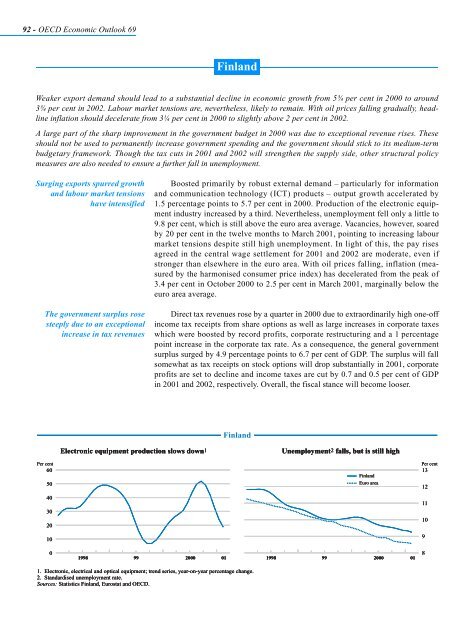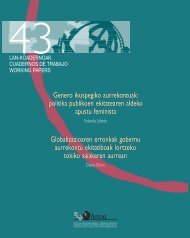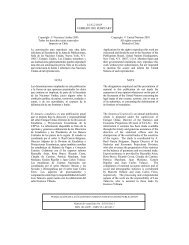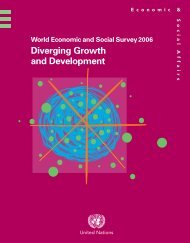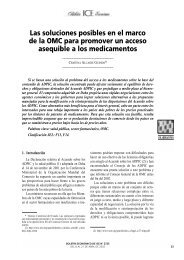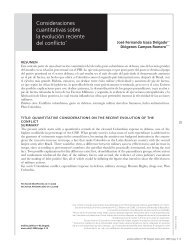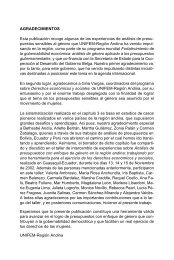OECD Economic Outlook 69 - Biblioteca Hegoa
OECD Economic Outlook 69 - Biblioteca Hegoa
OECD Economic Outlook 69 - Biblioteca Hegoa
You also want an ePaper? Increase the reach of your titles
YUMPU automatically turns print PDFs into web optimized ePapers that Google loves.
92 - <strong>OECD</strong> <strong>Economic</strong> <strong>Outlook</strong> <strong>69</strong><br />
Weaker export demand should lead to a substantial decline in economic growth from 5¾ per cent in 2000 to around<br />
3¾ per cent in 2002. Labour market tensions are, nevertheless, likely to remain. With oil prices falling gradually, headline<br />
inflation should decelerate from 3¼ per cent in 2000 to slightly above 2 per cent in 2002.<br />
A large part of the sharp improvement in the government budget in 2000 was due to exceptional revenue rises. These<br />
should not be used to permanently increase government spending and the government should stick to its medium-term<br />
budgetary framework. Though the tax cuts in 2001 and 2002 will strengthen the supply side, other structural policy<br />
measures are also needed to ensure a further fall in unemployment.<br />
Surging exports spurred growth<br />
and labour market tensions<br />
have intensified<br />
The government surplus rose<br />
steeply due to an exceptional<br />
increase in tax revenues<br />
Finland<br />
Boosted primarily by robust external demand – particularly for information<br />
and communication technology (ICT) products – output growth accelerated by<br />
1.5 percentage points to 5.7 per cent in 2000. Production of the electronic equipment<br />
industry increased by a third. Nevertheless, unemployment fell only a little to<br />
9.8 per cent, which is still above the euro area average. Vacancies, however, soared<br />
by 20 per cent in the twelve months to March 2001, pointing to increasing labour<br />
market tensions despite still high unemployment. In light of this, the pay rises<br />
agreed in the central wage settlement for 2001 and 2002 are moderate, even if<br />
stronger than elsewhere in the euro area. With oil prices falling, inflation (measured<br />
by the harmonised consumer price index) has decelerated from the peak of<br />
3.4 per cent in October 2000 to 2.5 per cent in March 2001, marginally below the<br />
euro area average.<br />
Direct tax revenues rose by a quarter in 2000 due to extraordinarily high one-off<br />
income tax receipts from share options as well as large increases in corporate taxes<br />
which were boosted by record profits, corporate restructuring and a 1 percentage<br />
point increase in the corporate tax rate. As a consequence, the general government<br />
surplus surged by 4.9 percentage points to 6.7 per cent of GDP. The surplus will fall<br />
somewhat as tax receipts on stock options will drop substantially in 2001, corporate<br />
profits are set to decline and income taxes are cut by 0.7 and 0.5 per cent of GDP<br />
in 2001 and 2002, respectively. Overall, the fiscal stance will become looser.<br />
Per cent Per cent<br />
60<br />
13<br />
50<br />
Finland<br />
Euro area<br />
12<br />
40<br />
30<br />
11<br />
20<br />
10<br />
10<br />
9<br />
0<br />
Finland<br />
Electronic equipment production slows down1 down1 down1 Unemployment2 Unemployment2 Unemployment2 falls, but is still high<br />
1998 99 2000<br />
01 1998 99 2000<br />
01<br />
1. Electronic, electrical and optical equipment; trend series, year-on-year percentage change.<br />
2. Standardised unemployment rate.<br />
Sources: Statistics Finland, Eurostat and <strong>OECD</strong>.<br />
8


